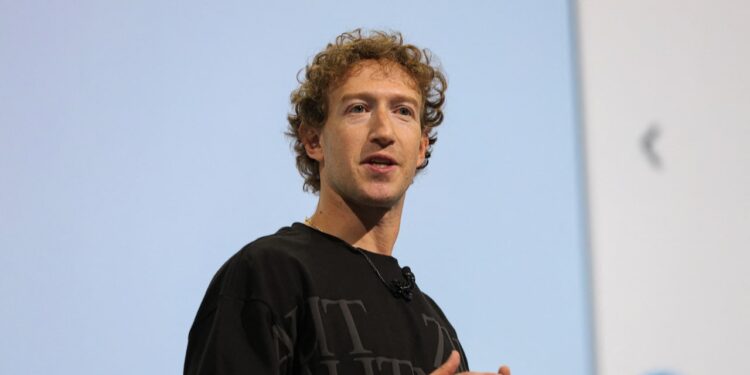Meta CEO Mark Zuckerberg has made created Meta Superintelligence Labs (MSL) and assembled a team of top AI researchers from competitors like OpenAI, Google, and Anthropic.
The new division signals Meta’s goal to compete with OpenAI and other AI leaders in developing artificial general intelligence, machines that can outthink humans.
Meta’s $14.3 Billion AI Investment Powers New Lab
Zuckerberg announced MSL through an internal memo, positioning the unit as Meta’s central hub for AI development. The lab combines Meta’s existing AI teams with a new research group focused on next-generation models.
Alexandr Wang, the 28-year-old former CEO of Scale AI, will lead the initiative as Meta’s first Chief AI Officer. Meta’s investment of $14.3 billion in Scale AI earlier this month paved the way for Wang’s recruitment.
“I consider him to be the most impressive founder of his generation,” Zuckerberg wrote in the memo. “He has a clear sense of the historic importance of superintelligence.”
Former GitHub CEO Nat Friedman joins as co-leader of MSL, heading AI products and applied research. Friedman previously served on Meta’s Advisory Group and brings experience from running one of the leading AI investment firms.
OpenAI Researchers Jump Ship to Meta
Meta has successfully recruited at least 11 AI researchers from major competitors, with eight coming from OpenAI alone. The high-profile departures include:
- Trapit Bansal – Pioneer of reinforcement learning on chain of thought and co-creator of OpenAI’s o-series models
- Shuchao Bi – Co-creator of GPT-4o voice mode and o4-mini
- Shengjia Zhao – Co-creator of ChatGPT, GPT-4, and multiple mini models
- Hongyu Ren – Co-creator of GPT-4o and various OpenAI models
- Jiahui Yu – Co-creator of o3, o4-mini, and GPT-4.1
The talent raid has prompted OpenAI to “recalibrate” compensation packages, according to an internal memo from Chief Research Officer Mark Chen. “I feel a visceral feeling right now, as if someone has broken into our home and stolen something,” Chen wrote in response to the departures, as reported by Wired.
Massive Pay Packages Drive AI Talent War
OpenAI CEO Sam Altman revealed that Meta offered researchers signing bonuses as high as $100 million to switch companies. The aggressive recruitment strategy has created unprecedented compensation levels in the AI industry.
“The market is setting a rate here for a level of talent which is really incredible and kind of unprecedented in my 20-year career as a technology executive,” Meta CTO Andrew Bosworth told CNBC.
Industry analysts compare the current AI talent war to NBA-level compensation packages, with companies offering multimillion-dollar deals without traditional interviews.
Meta’s AI Strategy Faces Internal Challenges
The superintelligence push comes after Meta’s AI division experienced setbacks. The company’s Llama 4 model received poor reception at Meta’s April AI conference, with voice interactions and other features falling short of expectations.
Internal discussions even considered “de-investing” in Llama and potentially embracing competitors’ AI models, according to sources familiar with the matter. Meta maintains full commitment to developing Llama with multiple releases planned this year.
Zuckerberg demoted Meta’s vice president in charge of generative AI and expanded the division to over 1,000 employees, up from a few hundred two years ago.
Competition Intensifies in Superintelligence Race
The creation of MSL positions Meta directly against OpenAI, Google, and Anthropic in pursuing artificial general intelligence. Zuckerberg believes superintelligence will mark “the beginning of a new era for humanity” and wants Meta to lead the development.
Meta’s approach differs from competitors through its open-source strategy with Llama models, though this has allowed other companies like China’s DeepSeek to build more advanced systems using Meta’s technology.
The company plans to launch Llama 4.1 and 4.2 models while simultaneously developing next-generation systems to reach the AI frontier within a year.
Reality Labs Losses Raise Questions About AI Spending
Meta’s heavy AI investment mirrors its approach with Reality Labs, which has burned through over $60 billion since 2020 with limited commercial success beyond Ray-Ban smart glasses and Quest headsets.
Some analysts worry Meta’s AGI bet could become another costly moonshot without near-term returns. However, Zuckerberg argues Meta’s business strength allows building “significantly more compute than smaller labs.”
The broader tech industry expects to spend $320 billion on AI in 2025, with Microsoft, Amazon, and Google all making massive talent acquisitions similar to Meta’s strategy.
Future of AI Development at Meta
MSL will integrate Meta’s AI across products serving over 1 billion monthly active users. The lab aims to develop AI that powers Meta’s social platforms, smart glasses, and emerging wearable technologies.
Meta’s unique position includes deeper experience building products for billions of users and leading the AI glasses category. The company’s structure allows moving “with vastly greater conviction and boldness” compared to smaller AI labs, according to Zuckerberg.
The success of Meta’s superintelligence efforts will determine whether the company can match OpenAI’s ChatGPT success and justify its massive AI investments. With top talent now in place, Meta faces the challenge of turning expensive acquisitions into breakthrough AI capabilities.














